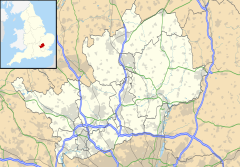Letchworth
| Letchworth Garden City | |
|---|---|
| Letchworth Garden City shown within Hertfordshire | |
| Area | 7.767 sq mi (20.12 km2) |
| Population | 33,249 (2011 census) |
| • Density | 4,281/sq mi (1,653/km2) |
| OS grid reference | TL215325 |
| District | |
| Shire county | |
| Region | |
| Country | England |
| Sovereign state | United Kingdom |
| Post town | LETCHWORTH GARDEN CITY |
| Postcode district | SG6 |
| Dialling code | 01462 |
| Police | Hertfordshire |
| Fire | Hertfordshire |
| Ambulance | East of England |
| EU Parliament | East of England |
| UK Parliament | |
Letchworth, officially Letchworth Garden City, is a town in Hertfordshire, England, with a population of 33,600. It is a former civil parish.
The town's name is taken from one of the three villages it surrounded (the other two being Willian and Norton) – all of which featured in the Domesday Book. The land used was purchased by Quakers who had intended to farm the area and build a Quaker community. The town was laid out by Raymond Unwin as a demonstration of the principles established by Ebenezer Howard who sought to create an alternative to the industrial city by combining the best of town and country living. It is also home to the United Kingdom's first roundabout, which was built in 1909.
As one of the world's first new towns and the first garden city it had great influence on future town planning and the New towns movement; it influenced Welwyn Garden City, which used a similar approach and inspired other projects around the world including the Australian capital Canberra, Hellerau, Germany, Tapanila, Finland, and Mežaparks in Latvia.) There is a link to town planning in Stalingrad through the architect V. N. Semionov and an account of Lenin visiting the town when he visited England for a congress of the Russian Bolshevik party, then banned in Russia.
Letchworth was one of the ancient parishes of Hertfordshire. The parish church of St Mary the Virgin was built in the 12th or 13th Century. The village was located along the road now called Letchworth Lane, stretching from St Mary's and the adjoining medieval manor house (now Letchworth Hall Hotel) up to the crossroads of Letchworth Lane, Hitchin Road, Baldock Road and Spring Road, where there was a post office. Letchworth was a relatively small parish, having a population in 1801 of 67, rising to 96 by 1901.
...
Wikipedia

